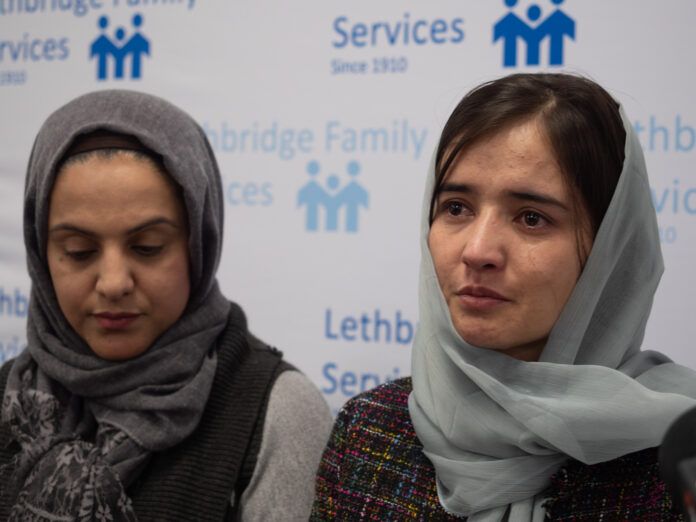Newly arrived refugees from Afghanistan are settling into a new life in Lethbridge. Lethbridge Family Services (LFS) welcomed 44 people on Oct. 5 who fled after the Taliban took control of the country. The refugees and their families were either human rights activists or supported Canadian operations in Afghanistan.
“Before I came here, I never had peace and I never lived in peace. I was always threatened, my life was always in danger because I used to be a journalist and was fighting for women’s rights,” said Nazifa Haidari, speaking through an interpreter.
She and Fahim Ahmadi started a protest on just the second day of being in Lethbridge, where they raised awareness of the danger people in their home country face. They held signs on the street calling for an end to genocide of the Hazara tribe in Afghanistan.
“I belong to a Hazara community myself and we did a protest. Right now my family is not safe and they are in Afghanistan, they are in hiding because of the conditions that they are living in and because of the tribe they belong in. So of course I don’t feel safe for them and when we came here, we did the protest — I realized how the Canadians are so welcoming and they were there to support us. I do feel safe and I do feel that I am not going to be quieting my voice. I am going to keep my voice. I am going to continue on with my fight as an activist, as a journalist for what I used to fight for for the Afghan women and the Hazara community.”

Ahmadi worked with NATO from 2010–2015 and had to flee to safety without his mother and sister when the Taliban took control.
“I was feeling that this was the time that the Taliban will catch me and will kill me because I used to work for infidels, according to the things the Taliban believe, and I was hiding for three months in Kabul in different places until I escaped to Pakistan and that’s why Canada just granted me the visa — because of my service to the NATO forces and U.S army, also Canadians,” he said.
Canada has welcomed over 20,000 Afghan refugees since August 2021 as the federal government continues its effort to resettle 40,000 Afghan refugees. Ahmadi and Haidari, along with the 42 others, are receiving help from Lethbridge Family Services to get settled into the city — this includes help moving into homes, getting children into school, setting up healthcare and financial aid.
John Lafferty, director if immigrant services at LFS, said the organization works with many partners to assist with the process and help from community members is also welcome.
“At this stage, we are not looking for any physical items, but what we are looking for is either cash donations or gift cards which we can use to give to the refugees to help them settle quickly. We simply don’t have the capacity to receive any physical items in the organization because we have got nowhere to store them,” he said.
One major thing that can help the new arrivals is housing — Lafferty said LFS is always looking to partner with property managers and landlords to help people find housing.
“They want to live here, they want to get employment and they want to start a new life and in order to do that, they need some safe, affordable accommodation which they can rent,” he said.
Ahmadi said it was exciting to be able to exercise his freedom of speech only days after arriving here and see support from community members.
“It’s good people and Canadians are [the] most [welcoming] people, they just welcome me every time any place and I have already made about 10 Canadian friends within two weeks,” he said. Though he is safe now, he said his thought are still with his family in Afghanistan and he also intends to continue to use his freedom of speech to educate and advocate for those who are unsafe there.
“When I came here, in the first day I told myself, ‘Fahim this is not the time to express your freedom — to exercise my freedom’ and I was very sure that I’m free here and I can do and ask my rights for my people back in Afghanistan,” he said.




